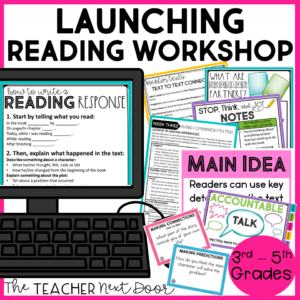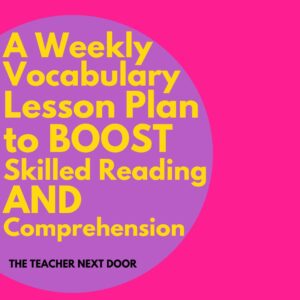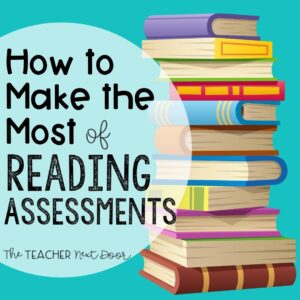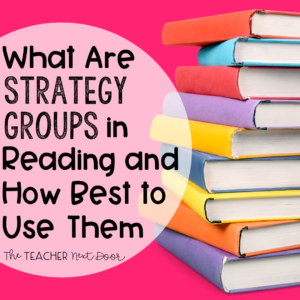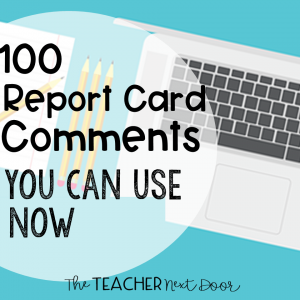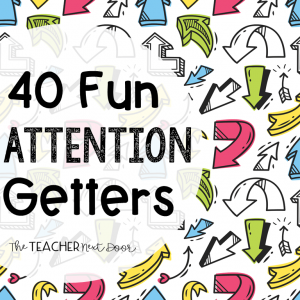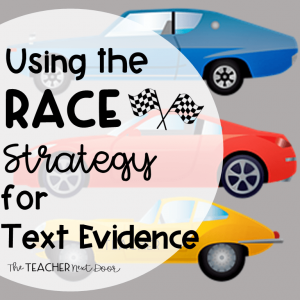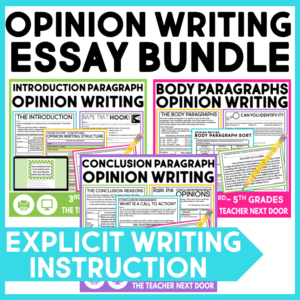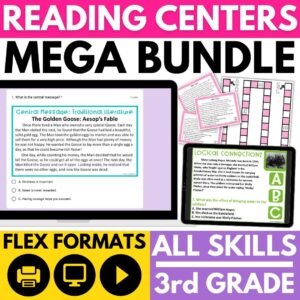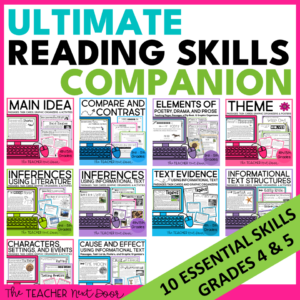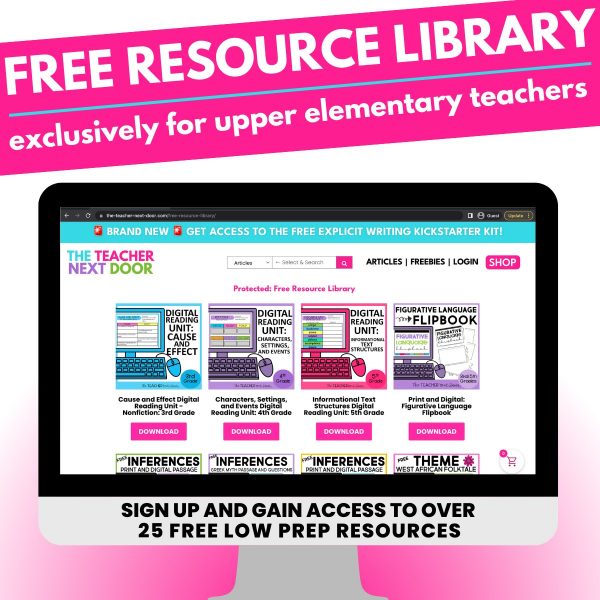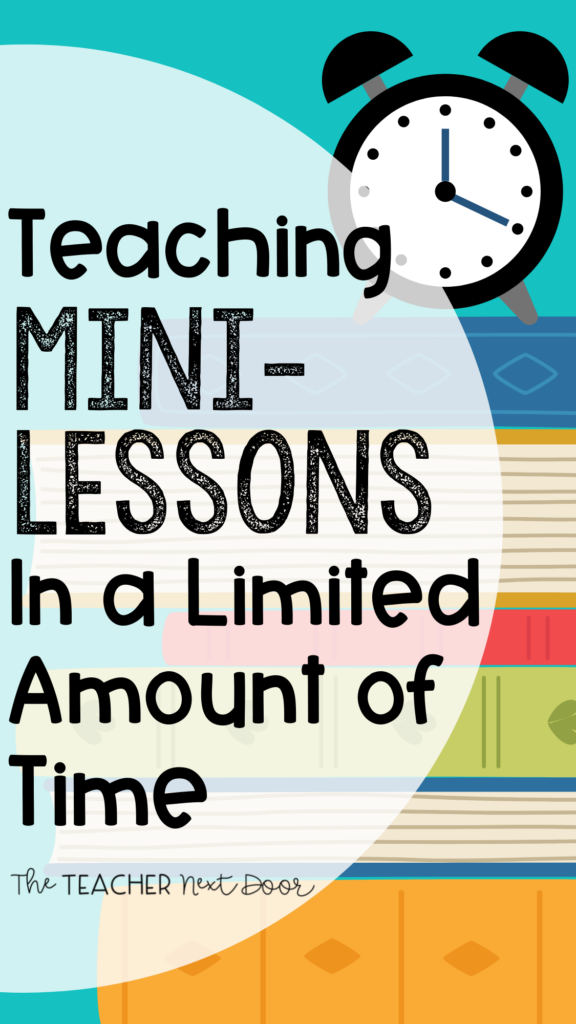
Mini-lessons are an important component of Reading Workshop, but teaching mini-lessons in a limited amount of time can be challenging!
After all, the entire mini-lesson should be 10 – 15 minutes long, with only about 6 minutes for the teaching part of the mini-lesson.
Why do we want to keep mini-lessons short and sweet? To:
- Gives students more time to read and practice reading skills and strategies
- Provides teachers with more time to do individualized reading conferences or to work with small groups
- Allows teachers to be mindful of students’ short attention spans
What are some practical ways to make mini-lessons brief but effective?
Before the Mini-Lesson:
1. Plan mini-lessons ahead of time
If you’ve taught for a while, there are lots of lessons that you can teach on command. You know exactly how the lesson should progress and with a few tweaks to match your students’ needs, you’re able to “wing-it” successfully.
Reading Workshop lessons are tightly structured though, While there’s definitely flexibility in delivery styles, you’ll want to zero-in on lesson planning for these.
Here’s an example of a mini-lesson plan I made for Making Predictions:
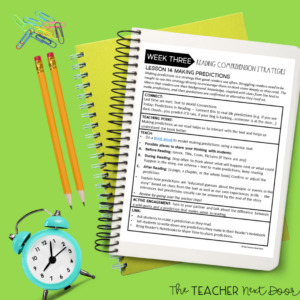
Knowing exactly what your teaching point is (one with a NARROW focus) and how to teach it is crucial. If you don’t have those ideas prepared, and you’re like me, you’ll most likely speak for too long, trying to explain it.
This is NOT to say that your lesson has to be scripted, but having simple notes that jog your memory can be helpful.
One teaching tool that helps me is to use a mini-lesson template like the one below from the Launching Reading Workshop unit. It gives me space to add which mentor text I’ll be using. It also leaves room for me to write or type any information that will keep my mini-lesson focused for the limited time frame.
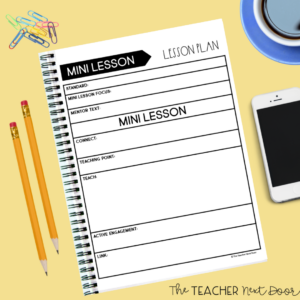
2. Strategically plan mentor texts for the mini-lesson
Often times, you’ll want to use mentor texts to illustrate a reading skill or strategy.
However, if you take the time to read an entire picture book during the mini-lesson, two things may happen:
- Students will get restless after the picture book reading and may find it difficult to stay on-task during the rest of the mini-lesson.
- Reading an entire picture book may take too much time out of the reading block itself, and we want students to spend the MOST time reading.
An alternative is to plan out which picture books you’ll need for which lessons and to make sure to read these books before the mini-lesson time, but not directly before.
You can read picture books for:
- Morning Meetings
- Snack time
- At the end of the day once students have packed-up
- For those 10 minute transitions (like before recess or lunch) odd bits of time
Once I’ve read a future mentor text as a read aloud, I drop it into my special basket (Mine! Mine! Mine!) This basket of books is for me, not for my students to read or the books may not be returned. when I need them.
As I plan for a mini-lesson, I grab the mentor text I plan to use and place a sticky note on the part of the book I’ll share with students.
During the mini-lesson, I may remind students of the book and then share a small snippet or a single page to model making an inference, identifying a character trait, or determining the theme.
The beauty of using mentor texts is that you can re-purpose a single book and use it for a variety of lessons. That’s a huge time saver!
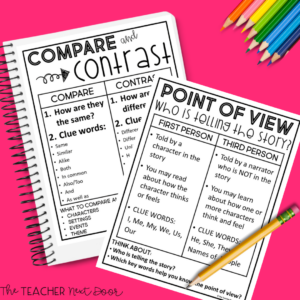
3. Get your anchor chart ready
I love using anchor charts because they’re such a visual way to organize information and can be super helpful for mini-lessons.
If you plan to use an interactive anchor chart, you’ll want to get the headings written ahead of time. Make sure to also leave space for student responses or sticky notes.
You can use digital anchor charts too and annotate on them if needed.
Sometimes, you may want to have copies of anchor charts for students to place in reader’s notebooks. You’ll want to make these copies ahead of time too.
During the Mini-Lesson:
1. As a general rule, keep the first two parts of the mini-lesson (the connection and teaching point) nice and simple.
Try not to veer off into a rabbit hole while making the connection to yesterday’s lesson. This may sound easy, but long stories and elaborate metaphors can take up precious time. In reality, they may not be needed.
For example, often times a simple connection like “Yesterday we…” is all students need.
In addition, the Teaching Point can be relayed in one or two sentences at the most. The teaching point is NOT the lesson. It’s an introduction to help students key into what they’ll be learning.
You might say something like, “Today we’re going to focus on…”
2. Make sure you are teaching the mini-lesson using a very narrow focus.
The lesson you will be teaching is not a wide, umbrella type of lesson. It’s not a big picture idea but almost like a microscopic idea.
You’ll be taking a reading concept that is usually quite large and teaching a very small part of it.
An example of this would be instead of teaching students how to identify character traits, you might teach a mini-lesson focusing on what the character says that shows his/her traits. Another day you can teach a lesson about what the character does that shows his/her character traits.
These baby steps lessons can combine over time to give students a much better picture of the big idea. Imagine if we tried to give them the whole big idea in one lesson, something would be missing.
One thing I want to mention is that you’ll need to get comfortable with the fact that that each mini-lesson is not expected to lead every student to mastery of that reading skill or strategy.
It would be silly to imagine that every child would understand a concept with one quick lesson.
That doesn’t mean we stop there, but rest assured that with repeated mini-lessons, your students will gain more exposure to these concepts. Also, you’ll be able to reinforce strategies as needed during reading conferences or small groups.
3. Carefully plan the active engagement part of the mini-lesson.
During a mini-lesson, the active engagement time comes after the focused teaching. Active engagement is the time for students to practice a strategy with their reading partner.
One tip is NOT to ask questions that will be answered by individual students as other students are sitting and listening.
To get the most participation in a short amount of time you can:
- Ask thumbs up or thumbs down types of questions to get all students participating.
- Use reading partners or pair-share (turn and talk buddies) so all students are able to share their ideas and practice together. You can listen-in on those near you to see how they’re responding to get a feel for how it’s going.
4. If you find that you’re consistently spending too much time on the mini-lesson, try a timer.
You can use your phone or even a kitchen-type timer.
Some teachers like to set it a few minutes before the mini-lesson time is up. Other teachers let it ring or beep when the mini-lesson should be over. It’s completely up to you.
Of course, you will want to explain to your students that you’ll be using a timer and why. Telling the class that we want to make sure to have plenty of time to read is a good explanation.
That’s it! Now that you know specific ways to keep the mini-lesson short and sweet, you’re ready to give it a try!
Do remember that like everything, becoming skilled at teaching Reading Workshop (and mini-lessons in particular) takes time, patience, and practice.
The more you practice teaching using the mini-lesson model, the more confident and proficient you’ll become!
If you’re new to Reading Workshop or are looking for a way to make it more effective, I have a set of time-saving, print and digital resources ready for you.
This Launching Reading Workshop unit has 4 weeks of mini-lesson plans, plus anchor charts, graphic organizers, reader’s notebook materials, bookmarks, posters, and more!
Click here to take a look at the Launching Reading Workshop unit!
Now that you have a handle on how to plan and teach mini-lessons, maybe you’re wondering how to plan for the year?
If you’d like to plan out the grade level reading skills and mini-lessons your students need for the year, I have a FREE set of pacing guides for 3rd, 4th, and 5th grades that I’d love to share with you.
This freebie includes pacing guides that are organized by weeks. They come in color, black and white, and in editable formats too, so you can tweak them to match your needs.
Want to read more blogs about Reading Workshop? Check these out!
- Everything You Need to Know About Launching Reading Workshop
-
Making the Most of Reading Workshop’s Independent Reading Time
-
The Complete Guide to POWERFUL Reading Conferences in Upper Elementary


